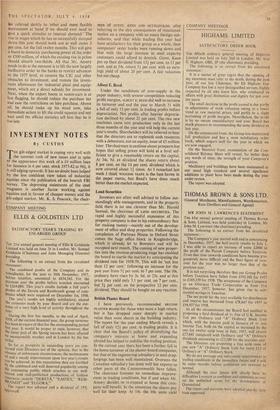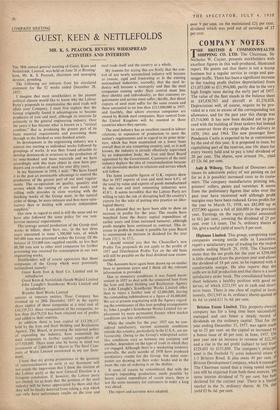INVESTMENT NOTES
By CUSTOS
THE gilt-edged market is coping very well with the summer rush of new issues and in spite of the appearance this week of a £4 million loan for Jamaica in 6 per cent. stock 1977-82 at 96/, it is still edging upwards. It has no doubt been helped by the less confident view taken of industrial equities since the publication of the bearish FBI survey. The depressing statements of the steel magnates is another factor working against equities and in favour of cheaper money and the gilt-edged market. Mr. K. S. Peacock, the chair- man of GUEST, KEEN AND NETTLEFOLDS, after referring to the dire consequences of renational- isation on a company with so many foreign sub- sidiaries, said that while trading this year had been satisfactory for their group as a whole, their companies' order books were running down and that with the large increase in steel capacity customers could afford to destock. Guest, Keen put up their dividend from 131 per cent. to 15 per cent, and at 54s. return 5/ per cent. with an earn- ings yield of about 20 per cent. A fair valuation but not cheap.
Albert E. Reed
Under the conditions of over-supply in the paper industry, with severer competition reducing profit margins, ALBERT E. REED did well to increase its turnover and end the year to March 31 with a fall of only 13 per cent, in trading profits before depreciation. Net profits after heavier deprecia- tion declined by about 21 per cent. The two new machines came into production only in the last three months of the year and will help the current year's results. Shareholders will be relieved to hear that the directors are to replenish cash resources with a debenture, not an equity, issue of £5 million later. The chairman is cautious about prospects but hopes that selling prices will hold at a level suf- ficient to give a reasonable return on the capital. At 34s. 9d. ex dividend the shares return about 8 per cent. on the 14 per cent, dividend which is now covered about 14 times. As I remarked last week I think WIGGINS TEAPE is the best haven in the paper storm, but Reed's have done much better than the market expected.
Land Securities
Investors are often well advised to follow out- standingly able managements, and in the property field there is no one cleverer than Mr. Harold Samuel, the chairman of LAND SECURITIES. The rapid and highly successful expansion of this property company is due to his extraordinary flair for making money—mainly out of the develop- ment of office and shop properties. Following the completion of Portman House in Oxford Street comes the huge office block in Knightsbridge, which is already let to Bowaters and will be occupied next month. The coming of new proper- ties into the revenue-producing stage has enabled the board to startle the market by anticipating the dividend rate for 1958-59. This will be 'not less than 12 per cent.' following an increase for the past year from 51 per cent. to 7 per cent. The 10s. ordinary have risen by 3s. 6d. to 23s. and at this price they yield only 3.1 per cent. on 7 per cent., but 5/ per cent, on the prospective 12 per cent. dividend. They should be bought on any reaction.
British Plaster Board
I have previously recommended BRITISH PLASTER BOARD for those who want a high return, but it has dropped more sharply in market value than most shares in the building industry. The report for the year ending March reveals a fall of only 124 per cent. in trading profits. It is clear that the Board's policy of diversifying the company's interests at home and expanding abroad has helped to stabilise the trading position. In the current year there has been a further fall in the home turnover of the plaster-board companies, but that of the engineering subsidiary in steel drop- forgings has been well maintained. Overseas the Canadian subsidiary has done well but exports to other parts of the Commonwealth have fallen. The chairman foresees no immediate improve- ment in trading conditions, but if and when Mr. Amory decides to re-expand at home this com- pany will benefit. In the meantime the shares pay well for their keep. At 14s. the 10s. units yield over 9 per cent. on the maintained 12/ per cent dividend which was paid out a earnings of r per cent.























































 Previous page
Previous page